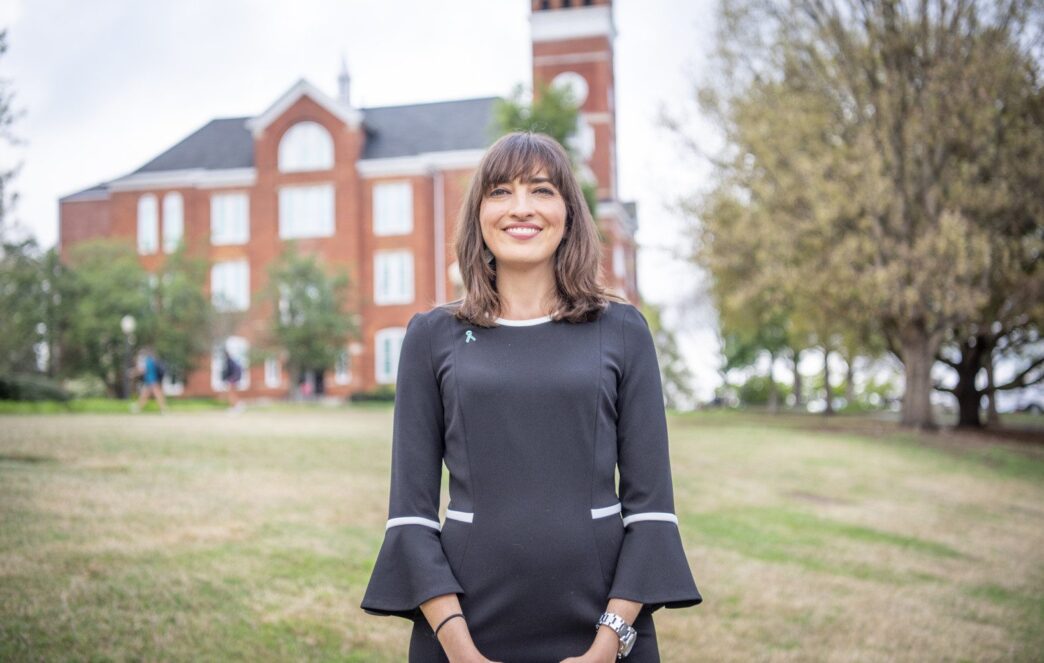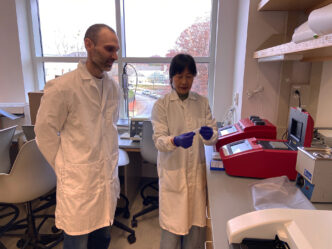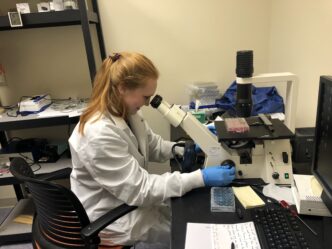[vid origin=”youtube” vid_id=”L7W8v2_eGN8″ size=”medium” align=”right”]
She dedicated her life to guiding others to happiness through her understanding of the depths of sadness.
An associate professor in Clemson’s Department of Psychology, Zinzow’s work in the areas of gender equality, sexual assault, and PTSD has garnered a slew of accolades, grants and national attention, but the awards she truly cherishes are the positive, tangible changes in peoples’ lives she’s played a hand in.
“Suffering happens everywhere, all the time – but there’s a way through it,” she says. “To be someone who can support others in that circumstance is a real privilege.”
Zinzow is the only licensed clinical psychologist on faculty, which puts her in a unique position to bridge the gaps between the science and the practice of psychology for her students.
Her meticulous and exhaustive research in campus suicide prevention, mental health treatment-seeking among veterans, and sexual violence prevention has informed real-world modifications to doctrine and practices at health care institutions, and the climate on Clemson’s campus. Lately, it’s also led to a seemingly endless stream of interview requests from local and national media outlets.
“It’s weird because I’ve been doing this kind of research for maybe 20 years now, and I didn’t get a lot of attention or calls about it, but in the last few years the national media has really focused on this topic,” she says, adding with a laugh, “I hope that means we’ll have more funding opportunities.”
To keep herself grounded in clinical psychology on a personal level, Zinzow keeps a private practice on top of all her work at Clemson.
“Research is important and necessary – you need the science behind the practice – but with research you don’t always get to see the impact that you have on a specific individual. What I love about practice is that I can see the difference I’ve made in one person’s life.”
Zinzow grew up in Winston-Salem, N.C. with three younger siblings, raised by a stay-at-home mom and a father who owned an insurance brokerage company. From a very early age, she ached for the ability to help people who were struggling.
“I remember in seventh grade wanting to go into psychology, being fascinated by why humans do what they do,” she explains. “I had friends who were sexual abuse and assault victims. It was very disturbing to learn about it at that age, and I wanted to understand how to help them.”

She earned her undergraduate degree in psychology from Duke University in 1998, and her Master’s and Ph.D. in clinical psychology from the University of Georgia in 2005 and 2007, respectively.
She was finishing her post-doctoral fellowship at the National Crime Victims Research and Treatment Center in Charleston as her husband, Dominic Mastroianni, was finishing his English degree at Emory University. They both came onto the job market at the same time. When he landed a professorship at Clemson, she found an opening for a tenure-track position in the Department of Psychology and jumped at it. That was 2008. Since then, the two have supported each other on many successful ventures at Clemson – not the least of which being their two children, an eight-year-old daughter and 10-year-old son.
“Dominic is the reason why I can do so much at the university,” Zinzow says. “He’s my biggest supporter. He helps take care of the house and the kids and does so many other things that allow me to do what I do.”
And boy does she do a lot. To name just a few things:
- She has worked extensively on sexual assault prevention initiatives at Clemson, joining a sexual violence task force under President James Barker that led to the hiring of a full-time interpersonal violence prevention coordinator.
- She is Co-PI on two grants to develop and evaluate technology-based sexual violence prevention programs, including an interactive online program for Clemson student athletes.
- She is a co-founder of Clemson’s suicide prevention initiative, Tigers Together. One of the major outcomes of this initiative was the development and evaluation of an advocacy training program to educate campus members on how to recognize suicide warning signs and refer at-risk students to resources.
- She was a contributor to Aspire to be Well, a comprehensive peer-led health and safety program for undergraduates.
- She has played multiple roles in the Clemson Tigers Advance initiative, an innovative plan of action funded by a grant from the National Science Foundation to reduce gender inequality and improve opportunities for all early and mid-career faculty at Clemson. As part of this initiative, she led the development of a Psychology departmental mentoring program, as well as a college mentoring program for CBSHS.
- She is a chair of the Tiger Advocates Advisory Board, which provides guidance for senior advocates who train men faculty on how to reduce gender bias and intervene as bystanders when they notice instances of inequity.
- She partnered with the College of Engineering and CU-ICAR to conduct a pilot study on virtual reality exposure therapy for driving anxiety and aggression in veterans, which is one of the leading causes of death for veterans.
The list goes on-and-on, but Zinzow points out a recent event that she’s particularly proud of:
“Dr. Martie Thompson and I just presented at the National Discussion on Sexual Assault and Sexual Harassment in Annapolis, Maryland. That was really exciting because there were lots of university presidents and provosts and senators there, and they had top-notch researchers presenting on the state-of-the-science for sexual violence prevention. I was really proud to be part of that because we had the opportunity to present what we’re doing here at Clemson.”
Her colleagues are just as proud that she’s a part of Clemson.
“I have known Dr. Zinzow for approximately 10 years and have had the honor of being one of her main collaborators,” said Martie Thompson, a professor in the Department of Youth, Family, and Community Studies. “We have worked together on suicide prevention and sexual violence prevention, and through these efforts, I have witnessed her dedication to her students and to conducting high-quality research and programming. It is with much admiration that I reflect on all the good work she has done for her students, department, university, and the field of sexual violence research.”
Her dedication to such serious subject matters begs the question: Does the somber nature of her work ever get to her?
An avid runner, she cherishes outdoor activities and spending time with her family. She and Dominic like to take their kids on trips, to show them the world outside of Clemson, and they challenge themselves with puzzles and other cerebral hobbies. But they would do all those things anyway. Her work is not necessarily depressing, she insists. From her perspective, it’s inspiring.
“There are certainly days when it’s heavier. Part of the treatment for PTSD, for instance, is to have someone tell the traumatic event over and over again in great detail so you as a clinician hear that, and that can be hard,” she says. “But for me this work is uplifting. It’s not something that drags me down. As a clinician you learn to latch on to the moments of progress and reward, when you see a person changing for the better. I fill my awareness with those moments. If I help just one person by the end of my life that will be one of the most important things I’ve done.”
Meet more Tigers here, and check out #FacesOfClemson on Instagram.
Related: 2019 Outstanding Women’s Award recipients honored








